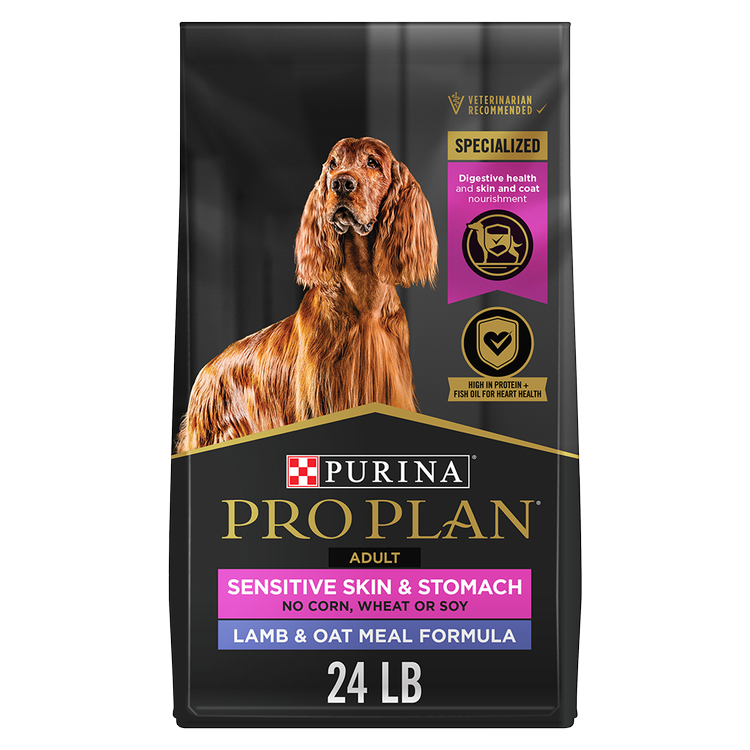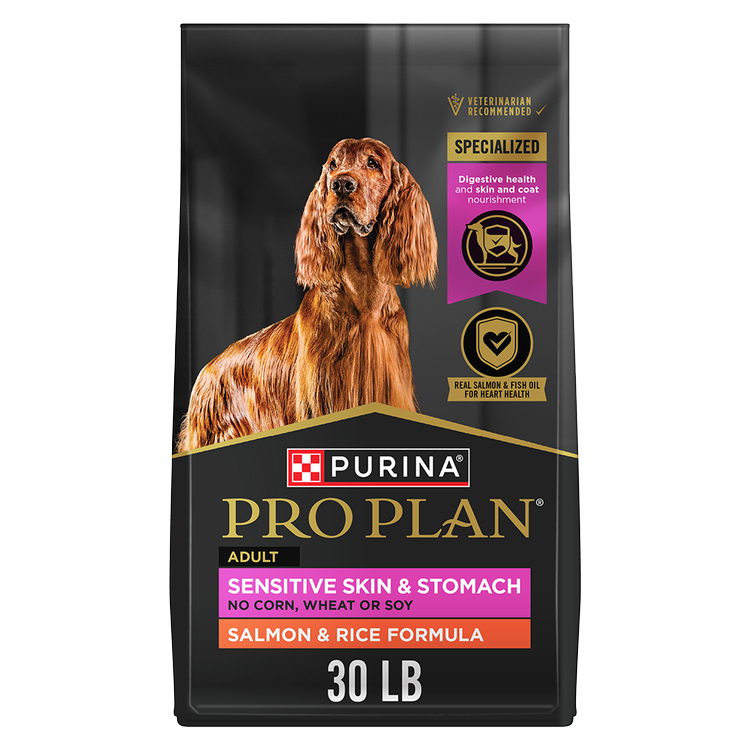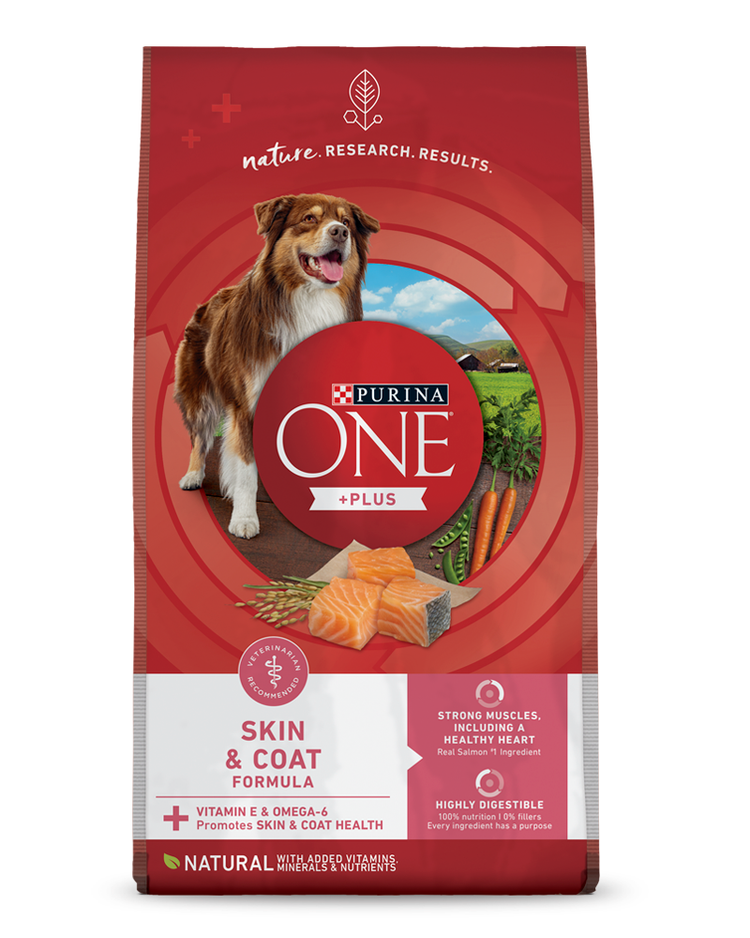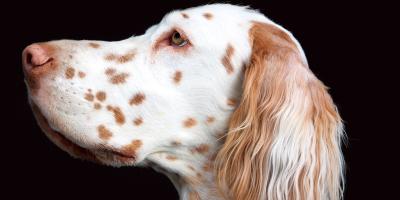Dog Sensitive Skin: Causes & Treatment


The signs of a dog’s sensitive skin are all too familiar: Intense itching and scratching; hair loss; and discoloring from persistent licking and chewing. If your dog exhibits any of these symptoms, exploring the causes – which could include their diet – is necessary to provide relief.
Here’s how to identify sensitive skin issues and how to address them, such as changing your dog’s food.
How Do I Know if My Dog Has Sensitive Skin?
If your dog has irritated skin, it’s important to get to the root of the problem. Your veterinarian can help you figure out whether your dog is suffering from a skin disease or allergies.
Allergic dermatitis can be triggered by many different things, from flea bite allergies to seasonal allergies like mold or pollen. The most common signs of allergic dermatitis are itching, scratching and chewing.
How to Provide Immediate Relief
Investigating the underlying cause of the problem is important but it can take some time.
The good news is that, while you await your appointment with your veterinarian or for test results to come back, you may be able to provide quick relief for your itchy dog at home. Here are a few options:
- Shampoo. Many shampoos are specifically formulated with natural ingredients and essential oils to soothe pets with dry, itchy skin.
- Brushing. Brushing your dog will remove loose or dead fur as well as dander. Plus, it can stimulate blood flow, which may reduce inflammation.
- Medication. Ask your veterinarian if common over-the-counter allergy medication is appropriate for your dog.
Could My Dog's Skin Health Be Influenced By Diet?
Your dog’s health, including skin health, is heavily influenced by their diet. Before you adopt a new diet trend for dogs with sensitive skin, though, ask your veterinarian if it’s healthy and worthwhile.
Many dog foods contain omega-6 and omega-3 fatty acids. Omega-6 fatty acids are found in plant sources, like grains, whereas omega-3 fatty acids are typically found in marine sources.
These fatty acids are important components of a dog’s diet and have a variety of biological functions, including promoting healthy skin. Some dogs may benefit from increased levels of omega fatty acids found in a dog food for sensitive skin.
Food Allergies vs. Food Intolerance
It can be easy to confuse food intolerance with food allergies. Some of the symptoms – itching, inflammation, gastrointestinal problems – are similar. Allergies, however, involve the immune system, while intolerance is your dog’s adverse response to specific ingredients (but is unrelated to the immune system).
Knowing the difference between allergies and intolerance can help you identify the main cause of your dog’s itchy skin.
It’s also helpful to know food allergies are often related to protein in your pet’s diet. Grain and gluten allergies are rare for dogs.
How to Diagnose Food Allergies & Food Intolerance
If you think your dog’s sensitive skin is caused by food, an elimination diet may help determine the problem. This process is like a dietary reboot.
Under the guidance of your veterinarian, stop giving your dog their current food and any flavored supplements or treats. Gradually transition them to a meal plan created by your veterinarian or veterinary nutritionist.
After at minimum eight weeks, once the sensitivity subsides, begin reintroducing foods to your dog one at a time until their symptoms return. If this sounds challenging, don’t worry – you will be doing this all under the close supervision of your veterinarian or veterinary nutritionist.
To see if your dog has environmental allergies, your veterinarian can administer skin testing.
What Should I Look for in a Sensitive Skin Dog Food?
A dog food formulated for sensitive skin should include:
- Omega fatty acids. Omega-3 and omega-6 fatty acids help nourish skin and promote a healthy coat. Look for dog foods that include a guarantee of Linoleic Acid (omega-6) or Eicosapentaenoic Acid (EPA) (omega-3).
- High-quality protein like salmon. Salmon and other ingredients like fish oil or fish meal are excellent sources of omega-3 fatty acids.
- Vitamins A and E. These promote skin cell health and antioxidant support, respectively.
Looking for a sensitive skin dog food for your dog? Learn more about our sensitive skin and stomach dog food options.
Other Food Options for Dogs With Sensitive Skin
In addition to sensitive skin dog food, ask your veterinarian if any of the following are a good idea for your pet:
- Limited-ingredient dog food. While it's not strictly hypoallergenic, limited-ingredient food contains proteins and carbohydrates that aren’t usually associated with allergies in dogs.
- Hypoallergenic dog food. Typically prescribed by a veterinarian, hypoallergenic food is made with hydrolyzed protein and low-allergen carbohydrates. This limits the risk of allergic reactions.
Get more dietary and health tips from our experts. You can also visit our Pet Expertise page.

Find Your Pet’s Perfect Food
Get your personalized recommendation with our Pet Food Finder tool.






